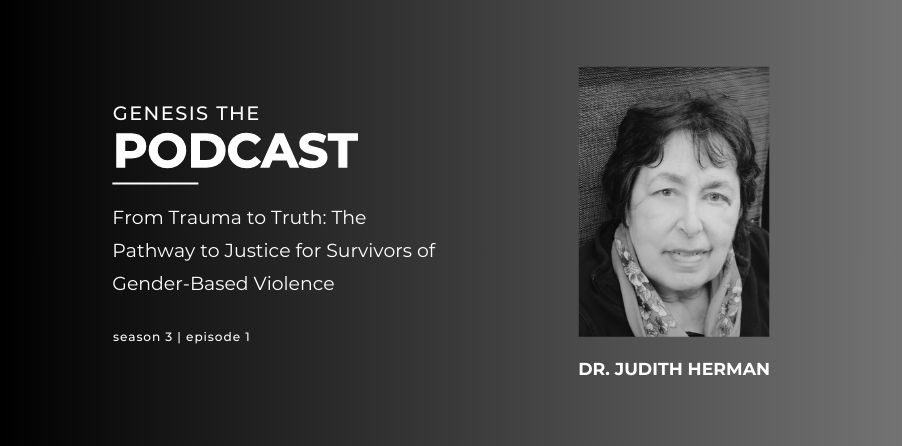From Trauma to Truth: A Conversation with Dr. Judith Herman

The aftermath of gender-based violence is a complex web of trauma that often remains misunderstood. To address this reality, we launched season 3 of Genesis The Podcast with a profound conversation with Dr. Judith Herman, a notable figure in the field of trauma studies. Her dedication to understanding trauma and supporting survivors has paved the way for remarkable advancements in this critical area of mental health.
In the early 1970s, Dr. Herman began her journey with survivors. She and her team developed a unique approach of gathering stories and writing books, providing survivors with a platform to reclaim their voices. The importance of believing someone in a safe space emerged as a powerful tool for initiating the healing process for trauma survivors. This practice challenges the societal narrative that often discredits the experiences of survivors, further exacerbating their trauma.
Delving deeper into the impact of trauma, the episode brings to light the profound consequences of childhood abuse on mental and physical health. The discussion builds on Dr. Herman’s groundbreaking work, “Trauma and Recovery”, which explores the long-term effects of trauma and outlines stages of recovery. These stages – safety, remembrance and mourning, and reconnection – serve as critical steps in the healing journey of trauma survivors.
In her latest book, “Truth and Repair: How Trauma Survivors Envision Justice”, Dr. Herman introduces a fourth stage of recovery. This stage, she explains, emphasizes the importance of envisioning a future for trauma survivors. It is a testament to their resilience and the human capacity to heal, even in the aftermath of unimaginable trauma.
However, healing from trauma extends beyond the individual survivor. It requires a societal shift towards validation and support for survivors of gender-based violence. The conversation explores the ‘tripod approach’ developed by Professor Diane Rosenfeld. This approach underscores the value of education, support services for survivors, and consequences and accountability for perpetrators.
Moreover, the episode delves into societal pressures encapsulated in the ‘Man Box’ – the macho stereotypes that young men often feel trapped by. It further highlights the importance of forgiveness, rehabilitation, and supporting survivors on their healing journey.
This episode emphasizes that trauma is complex and often misunderstood. However, by unraveling the threads of trauma and working towards healing and justice, we can create a safer, more supportive environment for survivors. This conversation with Dr. Judith Herman is not only a testament to her incredible work in the field of trauma studies but also serves as a call to action for all of us to better understand and support trauma survivors. To listen to this episode of Genesis the Podcast, click here.
